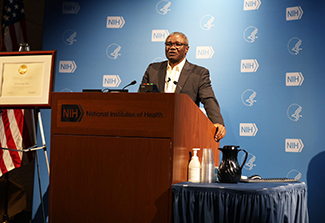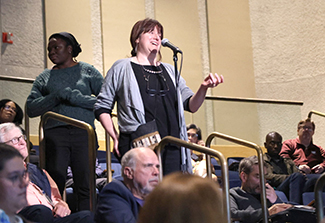Dr. Christian Happi talks infectious disease in Africa
November/December 2024 | Volume 23 Number 6
 Photo courtesy of Mariah Felipe-Velasquez
Dr. Christian Happi delivers his WALS lecture.
Photo courtesy of Mariah Felipe-Velasquez
Dr. Christian Happi delivers his WALS lecture.
The National Institutes of Health community collectively nominates speakers for the NIH Director’s Wednesday Afternoon Lecture Series, affectionately known as "WALS." Because these lectures help keep scientists on campus abreast of the latest advances, presenters include various leaders of biomedical and behavioral research. One such scientist is Dr. Christian Happi, who discussed “Genomic Surveillance and Characterization of Microbial Threats Facilitates Early Detection and Containment of Disease Outbreaks in West Africa” for his WALS lecture on the final Wednesday in October 2024.
Influence through teaching
Happi’s research career, which began at Harvard, investigates human infectious disease genomics and focuses on host-pathogen interactions. In 2013, he helped establish the African Center of Excellence for Genomics of Infectious Diseases (ACEGID) at Redeemer’s University in Nigeria with funding from the NIH and World Bank. There, he made several important contributions to infectious disease epidemiology.
“Of my career accomplishments to date, the most meaningful was my use of genomics technologies for early diagnosis and confirmation—within 6 hours—of Ebola virus disease in Nigeria,” he stated. His work helped contain the spread of disease in Nigeria, saving millions of lives during the Western Africa Ebola epidemic of 2013-2016. As director of ACEGID, he has contributed to the training of more than 2,000 scientists from 53 of Africa’s 54 countries. ACEGID, a WHO reference center for infectious diseases, was also where Happi became the first African researcher to use next generation genomic technology to sequence the SARS-CoV-2 virus—within 48 hours of receiving a sample from the index case in Nigeria.
“Genomic sequencing has revolutionized the way we approach healthcare and research,” he told the WALS audience. Unfortunately, though, many technologic, health, and economic benefits have yet to reach African scientists and patients, he added. Happi explored possible ways that Africa might avoid “missing the train.”
 Photo courtesy of Mariah Felipe-Velasquez
Each WALS lecture features a Q&A with the speaker.
Photo courtesy of Mariah Felipe-Velasquez
Each WALS lecture features a Q&A with the speaker.
Focus on fever
Seventy percent of pathogens capable of spurring an infectious disease epidemic are found in Africa, Happi noted. Alongside this powerful biodiversity, Africa is blessed with great natural and human resources. To take advantage of this strength, ACEGID aims to equip a critical mass of people with scientific knowledge and skills, so that a vibrant research environment can be established. To that end, ACEGID's master’s degree and PhD programs are internationally accredited.
In addition to universal coursework, the specialized training includes research on local problems, Happi explained. For example, fever is an early symptom of many viral illnesses, so ACEGID seeks to characterize, through metagenomics, the pathogens that drive febrile illness. Such focused training will help build the next generation of African “pathogen hunters.”
Happi noted that the Ebola outbreak was ACEGID’s “first baptism by fire.” At the start of the outbreak, diagnostic tests took too long—often 96 hours or more. This meant patients who appeared in clinic would return home before receiving a diagnosis. In some cases, those who had Ebola (but had not yet received a diagnosis) would unknowingly transmit the infection to others in the community. Happi’s Ebola rapid diagnostic test (RDT) solved this essential problem, and Nigeria was able to quickly contain Ebola, limiting the total number of in-country cases to just 20. ACEGID also “showed the world that in the midst of an outbreak we had the ability to capture and share genetic data,” said Happi, explaining that African scientists were able to deposit the results of their whole genome sequencing into a gene bank just 10 days after sample collection. “To control an infectious disease, you need two things: one is speed, second is accuracy.”
Following the Ebola outbreak, Happi and his team used CRISPR technology to create a RDT for Lassa Fever, a viral hemorrhagic fever endemic to parts of West Africa. “We also created a tool, Delphy, to help public health decision-makers respond in real time to infectious disease.” (Delphy performs near-real-time Bayesian phylogenetic analysis.) Carmen, a more recent platform developed by ACEGID and based on CRISPR technology, can analyze up to 49 different pathogens in a single test, said Happi. “We believe this is going to be a game-changer.”
 Photo courtesy of Merrijoy Vicente
A scientist attending the lecture asks Dr. Happi a question.
Photo courtesy of Merrijoy Vicente
A scientist attending the lecture asks Dr. Happi a question.
Augmenting infrastructure
Using genomic data to create tools that can be used in the field is only half the battle, said Happi. Enhanced African infrastructure is also needed. To that end, he continues to work towards establishing a network of 30 genomic centers of excellence across the continent. He also aims to enhance Africa’s manufacturing prowess in the areas of diagnostics, vaccines and therapeutics. These goals can be achieved by increasing the skilled workforce, establishing a long-term clinical trials network, and founding more local pharmaceutical production facilities, said Happi, a long-time Fogarty grantee who’s also been supported by the National Human Genome Research Institute, the National Institute of Allergy and Infectious Diseases, the National Institute of Biomedical Imaging and Bioengineering, and NIH’s Office of the Director.
Africa’s population is now 1.4 billion people. In 20 years, it will be 2.5 billion—making Africa the largest and most populated continent in the world, said Happi at the conclusion of his WALS lecture. “We really want to go beyond where we are now. Let’s be translational. Let’s use the information and the knowledge that we have for whole genome sequence data and infectious diseases research to create the next generation diagnostics and drugs.”
More information
Updated December 3, 2024
To view Adobe PDF files,
download current, free accessible plug-ins from Adobe's website.